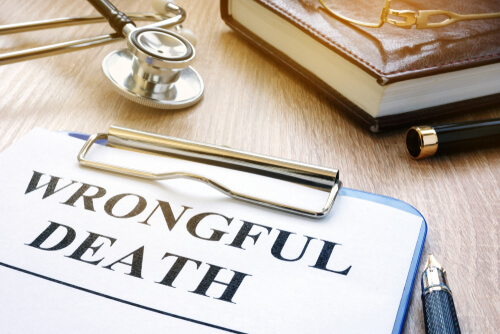
Accidents are a leading cause of death in the United States. In an average year, 33,000 people may die from a car crash, and another 25,000 thousand people could perish from a fall. This does not even count the thousands of people who will die from doctors’ mistakes or faulty medical devices. When someone else is responsible for your loved one’s untimely death, they will need to pay compensation.
Clients who have suffered the worst loss of all, the loss of a loved one, often ask about compensation in a wrongful death case. People want to know how much compensation they could receive and who can receive payment. These questions are especially pressing when the deceased left a family behind. A wrongful death attorney can guide you through the lawsuit process and answer all of your legal questions. Given the loss that families have suffered, it is only natural that they think about compensation. Not only would they want justice from the person responsible, but they would also need money to survive.
A Wrongful Death Claim Is a Negligence Action With Special Damages
First, a wrongful death claim will happen after someone has died, and you are seeking financial damages from the person responsible for their passing. Essentially, it is a special class of negligence for when someone has died because of someone else’s actions. Thus, the test for determining fault is the same as in a personal injury claim, but the damages and how they get paid are different.
Wrongful death cases can result from any type of injury.
For example, here are some examples of possible defendants in wrongful death cases:
- A truck driver when that truck has caused a crash where someone has died.
- A product manufacturer when their product has caused a fatal injury.
- A physician when medical malpractice has resulted in death.
- You may even file a wrongful death lawsuit in a homicide when there was no conviction of the perpetrator for the crime.
- An automobile driver from a fatal car crash.
Damages that You Can Recover in a Wrongful Death Claim
What you can recover in a wrongful death lawsuit depends on the state. Wrongful death lawsuits all depend on state law, so you need to know the rules of the jurisdiction where you will bring your lawsuit.
Here is what you can usually recover:
- Survival claim damages for the pain and suffering that the person experienced between their injury and death
- Lost wages that the person would have earned in the future
- The loss of any services that the deceased would have provided
- The loss of the value of the deceased’s care, nurturing, and guidance
- The loss of their love and companionship
- Any medical expenses incurred to treat their injury before they died
Some states may have damage caps that limit the amount of wrongful death damages. For example, Indiana imposes a $300,000 cap on wrongful death damages when the deceased did not have any children. Other states may have caps on items of the damages such as pain and suffering or wrongful death damages.
How Wrongful Death Damages Get Paid Depends on the State
How wrongful death damages get paid depends on the state in which you live. Different jurisdictions have varying rules as to who can file these cases and which family members can receive payment. In some states, a personal representative of the estate will file the wrongful death claim. In other states, the wrongful death lawsuit is brought directly by family members and is only filed by the estate if there was no spouse or direct descendants,
For purposes of illustration, we will choose two states and describe how their wrongful death rules work when families need to file a lawsuit. These states illustrate how wrongful death proceeds are paid and divided among family members. Most states will have their own Wrongful Death Act that lays out the legal requirements.
Your wrongful death lawyer will immediately advise you about your rights under your state’s law. They will tell you how to file the lawsuit and the time limits for your case. It is crucial to seek legal help right after the injury because you do not want to lose valuable time to file your lawsuit.
There Is a Hierarchy of Who Can File a Wrongful Death Lawsuit
First, states will always set out in law who has the right to bring a wrongful death lawsuit. You can always count on this list, including a spouse, children, and parents. If the deceased has none of these, the administrator of the estate can file a wrongful death suit. The question is the appropriate hierarchy of who can sue and who gets how much of the lawsuit proceeds.
For example, in Georgia, if the deceased was married at the time of their death, it is their spouse alone who has the right to bring the wrongful death action. Not even the children can file the lawsuit. It would be the surviving spouse who represents the children and must share the proceeds with them. The spouse is the one who can make decisions about the case and when to settle. This is true even if the children are adults.
How Much the Spouse Receives Also Depends on State Law
Georgia law would require that the surviving spouse receives at least one-third of the wrongful death settlement regardless of the number of children. Theoretically, the settlement or jury award would get divided between the spouse and the children.
The children would share the entire award if the deceased was not married at the time of death. If the deceased is divorced, their former spouse has no role in the case and does not share in the proceeds. The children file the case, and they divide the entire award. With no children or spouse, the parents would have the right to file a wrongful death claim. The proceeds of any settlement would be paid entirely to the parent.
Most states will use a similar damage division formula in cases with a spouse and children. The spouse will almost always get a guaranteed portion of the proceeds before the rest gets divided between them and the children. The law recognizes that the spouse must continue to support themselves in the absence of their loved one and suffered perhaps the greatest loss of all.
For example, like every other state, Pennsylvania gives all the money to the spouse if there were no children. If there are children, but no spouse, each of the children shares equally in the award. Like every other state, the issue is if there are children and a spouse. In Pennsylvania, the spouse always receives the first $30,000 of any wrongful death proceeds. For damages after that, the spouse would receive half, and each of the children receives an equal share of the other half.
How Much Others Get Depends on Whether the Claim Goes to the Estate
Family members are not the only people who may receive part of a wrongful death award. When the wrongful death settlement or verdict becomes a part of the estate, it is considered an asset of the estate. If the deceased left any debts behind them, creditors may have access to the estate’s assets to pay what the deceased owed. While it may seem unfair to the loved ones who are dealing with a financial loss, creditors could take part of the wrongful death award. In states where the wrongful death damages go straight to the beneficiaries, creditors cannot touch any proceeds of the settlement.
In addition, if there were any final expenses of the estate, these could also come out of the settlement. This could include medical expenses that the family incurred when the deceased was alive and funeral and burial costs. However, in some states like Georgia, family members would actually bring a separate wrongful death claim on behalf of the estate to recover expenses they owe in the name of the decedent as opposed to agreeing to one settlement and having expenses deducted.
Some Parts of a Wrongful Death Settlement May Be Taxable
Finally, the state and federal governments may tax part of a wrongful death award. Most elements of your wrongful death damages are not subject to tax obligations. This includes even the lost wages part of the settlements. However, a few parts of your wrongful death claim may leave you with a tax bill. This includes punitive damages and any emotional distress damages that do not result from the injury itself. In addition, if the wrongful death settlement is large enough, it could be subject to the estate tax before it gets distributed.
Note that the rules about how the wrongful death settlement gets paid will be noticeably different depending on whether the proceeds are paid to the estate or the beneficiaries directly. The major difference is whether other entities can take a cut off the top of the proceeds. However, even when the proceeds are paid directly to the beneficiaries, shares may get reduced based on expenses that the estate owes.
Each state may also have different rules about how the attorneys receive fees from the proceeds. In addition, if wrongful death proceeds get paid to the estate, you are also looking at a probate process to approve the distribution. This could add to the time that it would take for the beneficiaries to receive the award.
Wrongful Death Cases Can Lead to Large Awards
As you can see from above, wrongful death damages can be considerable. Just the lost wages part of it alone can lead to a large award, especially when the deceased was younger. When you are dealing with large lawsuits, you need legal counsel on your side to fight for your legal rights.
One of the most difficult parts of a wrongful death case is knowing how much your case is worth. There are so many elements of your case, and each of them alone could be worth a large amount of money. You may even have received a settlement offer or two. However, to properly evaluate a settlement offer, you need to know the true value of your case.
Your lawyer knows what your wrongful death case is worth. They understand how to fully and accurately value each element of your claim. If you receive a settlement offer, they will let you know very quickly if it is in the right ballpark. Then, they would advise you on what your counteroffer should be if you need to keep negotiating with the defendant.
Why You Need a Wrongful Death Attorney on Your Side

Wrongful Death Lawyer, David Brauns
Of course, before there is even a settlement, your attorney would need to make a case that someone else was responsible for your loved one’s death. They would investigate your claim and draft a legal complaint that sets out the relevant facts and shows why someone else should pay. Then, they would help you build your case through discovery. In other words, someone else would either need to be found legally responsible or be convinced enough of their possible liability to make you a settlement offer. Your attorney would help you prove that someone else was negligent and that it caused the death of your loved one.
When you are looking for a wrongful death lawyer, do not let cost get in the way of fighting the best attorney. This is because there is no cost upfront to hire a wrongful death lawyer. The lawyer only receives payment if your wrongful death claim is successful. Then, they receive a percentage of the proceeds of your settlement or jury award. This allows you to afford a lawyer when you are likely experiencing financial difficulties after the loss of a loved one. Contact Brauns Law Accident Injury Lawyers, PC for more legal advice.














